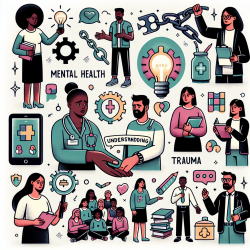Introduction
Hypoglycemia unawareness is a critical complication for individuals with Type 1 Diabetes Mellitus (T1DM) on insulin therapy. This condition can lead to recurrent severe hypoglycemic episodes, often requiring emergency medical intervention. Recent research highlights the importance of a multidisciplinary approach to manage such complex cases effectively. In this blog, we will explore how practitioners can leverage these findings to enhance patient outcomes.
Case Overview
The case study discussed in the research article involves a 55-year-old man with T1DM who experienced severe hypoglycemia unawareness. Over four years, he had more than 400 emergency responses and 56 hospitalizations due to hypoglycemic episodes. Despite using insulin glargine and aspart, his condition persisted, highlighting the need for a comprehensive care strategy.
Key Interventions and Outcomes
The research underscores several interventions that proved beneficial in managing the patient's condition:
- Continuous Glucose Monitoring (CGM): The patient was provided with a CGM device to facilitate real-time blood glucose monitoring and set hypoglycemia alerts. This technology played a crucial role in reducing hypoglycemic episodes.
- Educational Support: A diabetes nurse educator and dietitian offered guidance on blood glucose documentation, insulin self-administration, and dietary management. This educational intervention aimed to improve the patient's self-management skills.
- Multidisciplinary Team (MDT) Approach: A team comprising endocrinologists, dietitians, community paramedics, and psychologists was assembled to address the patient's multifaceted needs. This approach helped in identifying and mitigating barriers to effective hypoglycemia management.
- Community Outreach and Support: Regular community check-ins and technological support were provided to the patient, ensuring consistent follow-up and reducing the need for emergency medical services.
Implications for Practitioners
Practitioners can draw several lessons from this case study to improve their practice:
- Embrace Technology: Incorporating CGM devices can significantly enhance patient autonomy and reduce hypoglycemic episodes. Practitioners should advocate for technology use in diabetes management.
- Adopt a Holistic Approach: Addressing the psychological, social, and economic dimensions of diabetes care is crucial. A multidisciplinary team can provide comprehensive support to patients, improving overall outcomes.
- Focus on Education: Continuous patient education on diabetes management can empower patients and improve adherence to treatment plans. Tailoring education to individual needs is essential.
- Community Engagement: Leveraging community resources and support systems can reduce healthcare costs and improve patient outcomes. Practitioners should collaborate with community programs to provide holistic care.
Conclusion
The case study demonstrates that hypoglycemia unawareness in T1DM patients requires a multifaceted approach. By integrating technology, education, and community support, practitioners can significantly improve patient outcomes. This research highlights the potential for multidisciplinary care to transform diabetes management.
To read the original research paper, please follow this link: Hypoglycemia Unawareness and Recurrent Severe Hypoglycemia in an Individual With Type 1 Diabetes Mellitus on Insulin.










